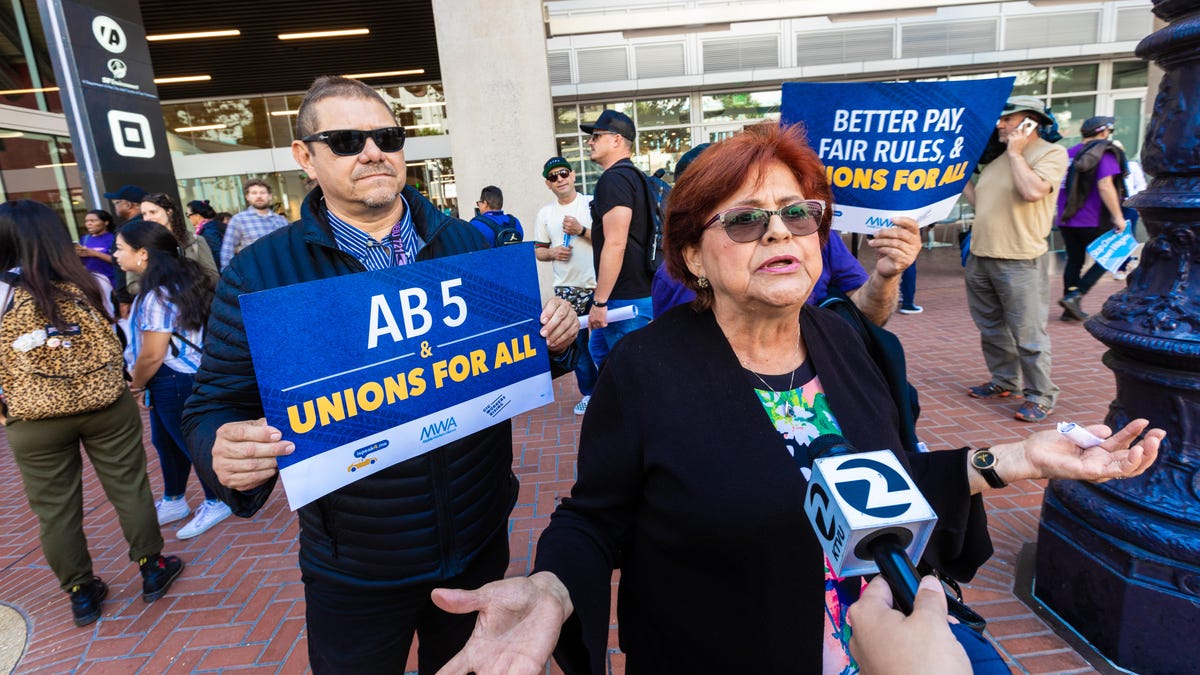Uber, Postmates dealt blow as California judge denies AB 5 injunction
The two gig companies still have to answer to the state of California as their lawsuit against it plays out.

Gig workers rallied in support of AB 5 before it was voted into law in September.
Uber and Postmates won't be getting the reprieve they were hoping for from a new California gig worker law. A federal judge denied their request to put a temporary stop to AB 5 while a lawsuit they filed against the state works its way through the courts. This means both companies are still beholden to the law, which could force them to reclassify their drivers as employees.
"The court does not doubt the sincerity of these individuals' views, but it cannot second guess the legislature's choice to enact a law that seeks to uplift the conditions of the majority of nonexempt low income workers," US District Judge Dolly M. Gee wrote in a 24-page ruling on Monday. "The balance of equities and the public interest weigh in favor of permitting the state to enforce this legislation."
AB 5 boils down to worker classification. Currently, most workers for gig economy companies, like Uber, Lyft, Postmates and DoorDash, are classified as independent contractors. While that classification can mean increased flexibility for workers, it can also mean those drivers are shouldering many of the costs of their employers. Uber drivers, for example, pay for their own car, phone, gas and vehicle maintenance. They also don't get basic benefits, such as minimum wage guarantees, overtime pay and health insurance.
Under AB 5, which went into effect on Jan. 1, all companies using independent contractors in California will be put to a three-part test to determine whether they must reclassify their workers. If they don't pass that test, they'll have to turn their workers into employees.
Many of these companies say such a move could harm their businesses. Managing massive workforces can be unwieldy and expensive. A Barclays analysis from June said reclassifying California drivers as employees could cost Uber $500 million per year and Lyft $290 million per year.
"We are joining a growing group of companies and individuals suing to ensure that all workers are equally protected under the law and can freely choose the way they want to work," an Uber spokesman said in an emailed statement.
Uber, Postmates and two gig workers, Lydia Olson and Miguel Perez, filed their lawsuit against the state of California in late December aiming to have AB 5 declared invalid. The lawsuit alleges that AB 5 is unconstitutional and that it unfairly targets gig economy companies and workers. They also requested a preliminary injunction against the law that would stop it from being applied to them while their case is being considered. This injunction is what Judge Gee denied on Monday.
Similar lawsuits have been filed against the state, including one brought by truck drivers and another by freelance journalists, who say the legislation would harm those workers and industries. A judge presiding over the truck drivers' lawsuit granted a temporary restraining order in that case, which exempted independent truckers from the law.
Both Uber and Postmates said they're weighing their options to appeal Gee's decision.
"This is a procedural decision on the preliminary injunction only," a Postmates spokeswoman said in an emailed statement. "While we look forward to continuing to present our full case on the merits, the decision comes as a disappointment to the on-demand workers (Lydia Olson and Miguel Perez) who filed suit to protect their flexibility and income."

